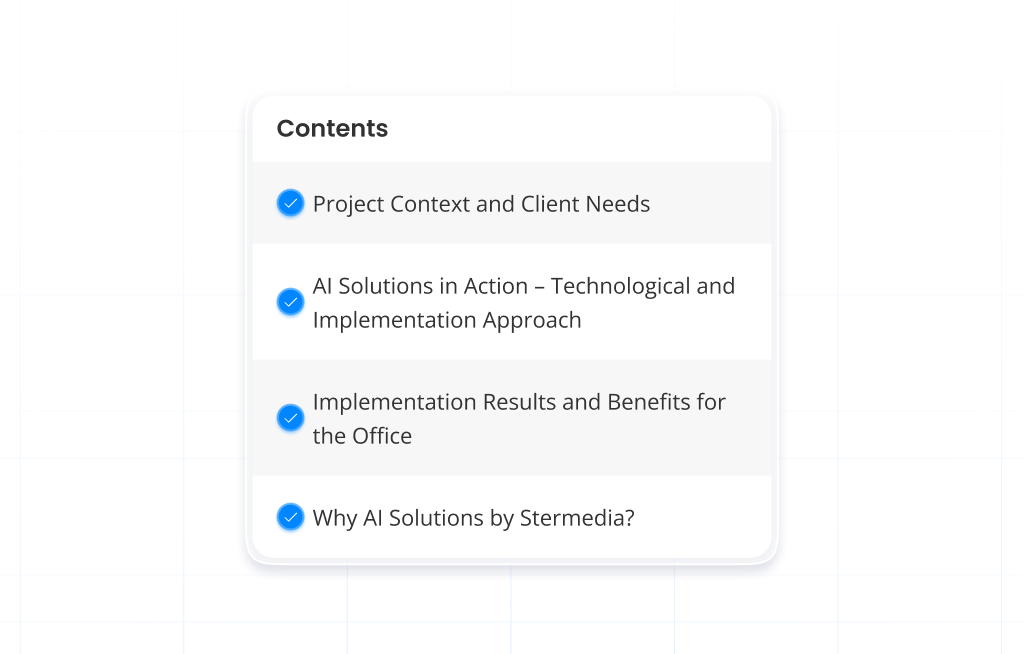As part of the AI Solutions project, Stermedia implemented a comprehensive correspondence automation system at a municipal office in a mid-sized coastal city in Poland. This office processes a high volume of documents daily from various channels. By leveraging robotic process automation (RPA), intelligent document processing (IDP), and integration with municipal systems, the Office gained a scalable, flexible, and fully tailored solution.

Project Context and Client Needs
The municipal office faced a growing number of citizen cases and a wide range of communication channels. Incoming documents arrived via the ePUAP platform, email inboxes, and in paper form, all of which required tedious manual classification and routing to the appropriate departments. The goal was to implement a unified solution that would accelerate and streamline this process, relieve employees from repetitive tasks, and eliminate the risk of human error.
AI Solutions in Action – Technological and Implementation Approach
Stermedia designed a solution based on an RPA platform with OCR/IDP components, enabling automatic retrieval and analysis of documents from multiple sources. Documents arriving via ePUAP and email were categorized using predefined rules, while for scanned paper correspondence, content recognition and data extraction were applied. The system then routed documents to the relevant departments based on their content, sender, or specific keywords. Additionally, it was fully integrated with the document management system and included automatic notifications for stakeholders.
The project was managed using Agile methodology, which allowed the team to quickly respond to officials’ needs and flexibly develop new functionalities. Stermedia’s team worked closely with the IT department and the Resident Services Department to precisely adapt the solution to real administrative challenges.
Implementation Results and Benefits for the Office
- Increased efficiency by eliminating repetitive manual tasks.
The automation of correspondence processing significantly reduced the time spent on manual sorting and routing. Employees can now focus on tasks requiring expertise, which has improved both productivity and operational efficiency. - Reduction of human errors.
The automated classification system minimizes the risk of mistakes caused by manual handling. This increases trust in the office and reduces the need for later corrections. - Relieving employees from routine work.
Repetitive, low-value tasks are exhausting and demotivating. Automation allows employees to focus on higher-level work that matches their skills, improving both efficiency and job satisfaction. - Improved quality of service for residents and businesses.
Cases are directed to the right departments faster, and automatic notifications allow stakeholders to track the status of their documents. This has improved transparency and reduced the number of “What is the status of my case?” inquiries. - Standardization of correspondence handling across all channels.
Previously, handling documents from different sources—ePUAP, email, or paper—involved inconsistent procedures and manual sorting, which complicated process control and increased the risk of errors. With automation, all documents follow the same processing rules, ensuring consistency and improving quality control. - Better information management and data access.
Previously, the lack of visibility into officials’ activities made supervision and decision-making difficult. Integration with document management systems now enables real-time reporting and analytics, improving transparency and supporting both day-to-day management and strategic decision-making. - Seamless integration with existing IT infrastructure.
The solution was designed to work with the Office’s existing systems, eliminating the need for costly data migrations. This ensured a smooth implementation without disrupting daily operations.
Why AI Solutions by Stermedia?
Stermedia combines expertise in automation, software engineering, and IT consulting to deliver solutions tailored to the public sector. On our website, you can find additional case studies showcasing AI Solutions implementations in industries ranging from public procurement to healthcare.
It’s worth adding that foreign administrations also recognize the value of AI. According to a Financial Times report, the UK government conducted an experiment using AI tools like Copilot, showing that officials save an average of 26 minutes daily – which translates to about two weeks annually. This confirms that solutions like the one implemented in this municipal office have a real, measurable impact on improving administrative operations.

Want to relieve your team and streamline office processes? Get in touch with us – together we’ll build a solution that truly works.



